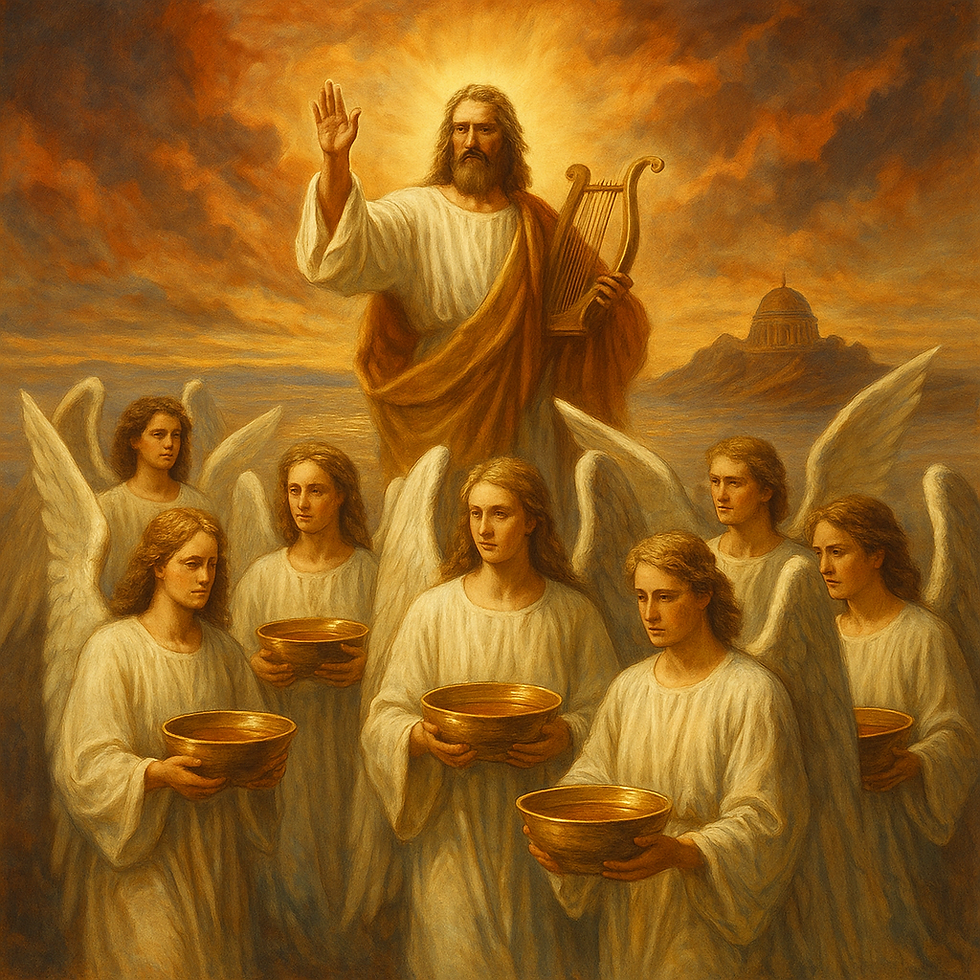啓示錄 15 章 Revelations 15
- 馬克牧師

- Jul 15, 2025
- 6 min read
Updated: Aug 26, 2025

各位平安,我們今天一起來看的是《啟示錄》第15章。
這章節的畫面很壯觀,可以說是故事快接近尾聲的時候。天上出現了一個很大的異象——有七位天使手裡拿著最後的七個災難,這些災難象徵著神的憤怒已經來到終點。
接著我們看到一個得勝的場景。那些曾經打過屬靈的仗,戰勝了獸和牠的名字的人,現在都站在像玻璃海一樣的地方,手裡拿著神的琴,開始唱歌。他們唱的是摩西之歌和羔羊之歌。
這些人,曾經受過逼迫、甚至為信仰犧牲,現在卻站在神面前,用全心全意敬拜讚美。歌詞中說到:
主神-全能者啊,
你的作為大哉!奇哉!
萬世之王啊,
你的道途義哉!誠哉!
4主啊,誰敢不敬畏你,
不將榮耀歸與你的名呢?
因為獨有你是聖的。
萬民都要來在你面前敬拜,
因你公義的作為已經顯出來了。
這邊經文特別提到一首歌,叫做「神僕人摩西的歌」和「羔羊的歌」。
摩西,是舊約中非常重要的代表人物。神透過他把律法啟示給以色列人;當他們過紅海之後,摩西帶著百姓唱了一首讚美的詩歌,感謝神的拯救。而到了新約,代表人物就是羔羊——也就是耶穌基督,這位為我們捨命、帶來最終救恩的救主。
在《啟示錄》這裡,約翰再次用到這個畫面,讓我們看到:當我們「過海」之後,也就是經歷了各樣患難與挑戰、堅持到底後,我們也可以像當年以色列人那樣,站立起來,唱這首屬於得勝者的歌。
這首歌本身,引用了很多舊約經文,像是出埃及記、詩篇,甚至耶利米書、但以理書裡面的內容。約翰不是隨便寫歌詞,他其實是在傳遞一個很深的訊息:
為什麼那些為信仰受苦、甚至殉道的人,要經歷這麼多艱難?
因為——當我們真正見到神的榮耀,當我們站在天堂,面對那位全知全能的神,當我們看見整個救恩的全貌時,地上一切的痛苦、傷害、逼迫,真的都變得微不足道了。
地上的苦難,也許長達十年、甚至一輩子,但和永恆的榮耀、永恆的平安相比,它根本不值得一提。這不是要我們忽略痛苦,而是讓我們知道:神的應許、神的榮耀,將會徹底翻轉我們對苦難的理解。
接著,約翰看見天上聖所中存放法櫃的殿被打開,掌管這七個最後災難的天使從殿中出來。他們身穿潔白發光的細麻衣,腰間束著金帶。然後,有一位活物把盛滿了神烈怒的金碗交給了他們。
這些金碗,代表的就是上帝即將傾倒在地上的審判,也就是最後審判的序幕即將展開。
而在這個畫面之後,約翰記錄了一個震撼的場景——第八節說:「因神的榮耀和能力,殿中充滿了煙,沒有人能進入殿中,直到這七災完畢。」這一幕也類似在以賽亞書中,當以賽亞看到上帝的時候,他說他必定要死了。殿中也是充滿煙霧。6:4 因呼喊者的聲音,門檻的根基震動,殿充滿了煙雲。
這意味著,上帝的榮耀和能力讓人沒有辦法接近,甚至無法進入祂的殿。祂的本體,我們用肉眼是看不見的,祂的存在,是人無法靠近的榮光。只有當最終的審判結束,當一切完成,當我們得著那個新的身體、有新的眼睛時,我們才能真正見到祂的榮耀,與祂面對面。
這一段經文提醒我們一件事——上帝的義怒,祂的公義審判,是一定會來到的。沒有人能阻擋,也沒有人能預先完全理解祂的作為。祂的時間、祂的方式,遠遠超過人的想像。
但這也同時帶出一個盼望:當這一切完成,我們將能完全與神同在,永遠不分離。這不是恐懼的結局,而是一個通往完全同在的開始。
第十五章的經文簡短,但這還不是結局,約翰繼續要記載接下來的可怕異象。我們下一講繼續默想第十六章的經文。感謝各位的聆聽。
Peace to you all. Today we will look together at Revelation chapter 15.This passage presents a grand vision, almost like the story is nearing its climax. In heaven appears a great vision—seven angels holding the last seven plagues, symbolizing that God’s wrath has reached its completion.
Next, we see a scene of victory. Those who fought the spiritual battle and overcame the beast and its name now stand on something like a sea of glass, holding harps of God and beginning to sing. They sing the song of Moses and the song of the Lamb.
These are the people who once endured persecution, even sacrificing their lives for faith, but now they stand before God, worshipping and praising with all their heart. The lyrics say:
Lord God Almighty,great and marvelous are Your deeds!King of the nations,just and true are Your ways!Lord, who will not fear You,and glorify Your name?For You alone are holy.All nations will come and worship before You,for Your righteous acts have been revealed.
Here the Scripture mentions a special song called “the song of God’s servant Moses” and “the song of the Lamb.”
Moses, in the Old Testament, was a most important figure. Through him God revealed the Law to Israel. After crossing the Red Sea, Moses led the people in a hymn of praise, thanking God for deliverance. In the New Testament, the representative figure is the Lamb—that is, Jesus Christ, the Savior who gave His life for us and brought final salvation.
In Revelation, John again uses this imagery to show us: when we have “crossed the sea”—that is, after going through trials and tribulations and persevering to the end—we too, like Israel of old, will stand and sing the song of the overcomers.
This song itself quotes many Old Testament passages, from Exodus, the Psalms, even Jeremiah and Daniel. John wasn’t randomly writing lyrics; he was delivering a profound message:
Why must those who suffer for faith, even martyred, go through such hardship?Because—when we truly behold God’s glory, when we stand in heaven before the all-knowing, almighty God, when we see the full picture of salvation—then all the pain, harm, and persecution on earth will become insignificant.
Earthly suffering may last ten years, or even a lifetime, but compared to eternal glory and everlasting peace, it is nothing. This does not mean we ignore pain, but it assures us that God’s promise and His glory will completely transform our understanding of suffering.
Then John saw the temple in heaven, the tabernacle of the covenant, opened. The seven angels with the seven final plagues came out of the temple, clothed in shining, pure linen, with golden sashes around their waists. One of the living creatures gave them seven golden bowls filled with the wrath of God.
These bowls represent the judgment God is about to pour out on the earth—the beginning of the final judgment.
After this, John records a striking scene—verse 8 says: “The temple was filled with smoke from the glory of God and from His power, and no one could enter the temple until the seven plagues of the seven angels were completed.” This resembles Isaiah’s vision when he saw the Lord and said he was doomed, for the temple was filled with smoke: “At the sound of their voices the doorposts and thresholds shook, and the temple was filled with smoke” (Isaiah 6:4).
This shows that God’s glory and power are unapproachable—no one can enter His temple. His essence cannot be seen with human eyes; His presence is an unapproachable radiance. Only after the final judgment is finished, when all is complete, when we are given new bodies and new eyes, will we truly see His glory and meet Him face to face.
This passage reminds us of one thing—God’s righteous wrath, His just judgment, will surely come. No one can stop it, and no one can fully comprehend His deeds beforehand. His timing and His ways far exceed human imagination.
But at the same time, it brings hope: when all is complete, we will dwell fully with God, never again separated. This is not a fearful ending, but the beginning of perfect union with Him.
Chapter 15 is brief, but it is not the conclusion—John goes on to record even more dreadful visions. In our next session, we will reflect on chapter 16. Thank you all for listening.








Comments